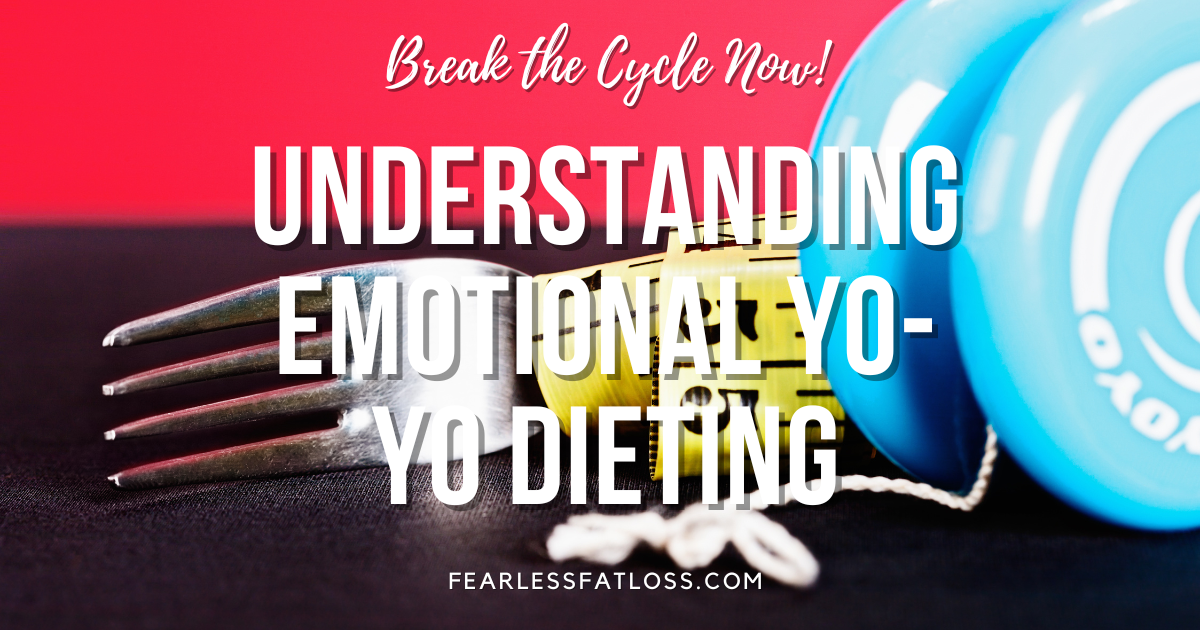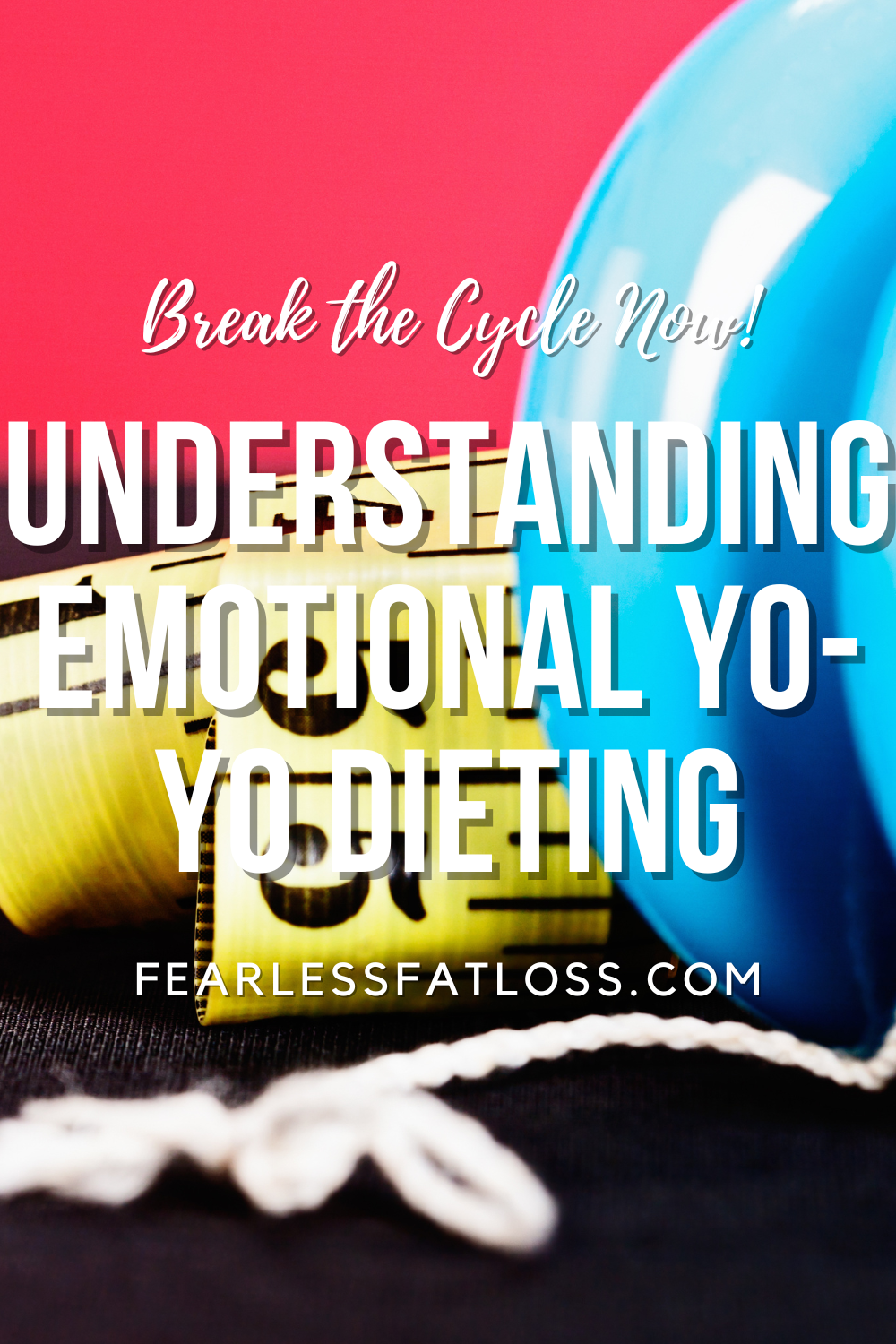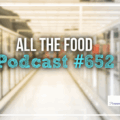Understanding Emotional Yo-Yo Dieting: Breaking the Cycle for Good!
Everyone has heard of emotional eating but what about emotional yo-yo dieting? Emotional yo-yo dieting is a behavior that will not allow you lose weight and keep it off. Your weight loss goal will forever be “out there” because even if you’re able to reach it, you’ll quickly return to emotional eating, therefore fulfilling the emotional yo-yo dieting cycle.
What Is Emotional Yo-Yo Dieting?
If you’ve ever found yourself on a cycle of restrictive dieting followed by periods of eating freely or even overeating, you may be familiar with the concept of *yo-yo dieting*. But there’s a new term that sheds light on an even deeper aspect of this pattern: *emotional yo-yo dieting.*
You may not have heard of it before, but it could be the key to understanding why so many diets fail to create lasting change.
I’m a mind-body weight loss coach with over 15 years of experience helping clients break free not only from yo-yo dieting but also from emotional eating, binge eating, mindless eating and more. Many people believe that dieting and emotional eating are separate issues, but they’re often closely intertwined. Emotional yo-yo dieting occurs when our eating and dieting patterns are heavily influenced by emotions. Rather than just a pattern of physical dieting and weight regain, emotional yo-yo dieting connects deeply to our feelings, mindset, and approach to self-care.
In this post, I’ll break down what emotional yo-yo dieting is, tackle common myths about dieting and emotional eating, and explain why it’s so important to address the emotional roots of your weight loss journey if you want lasting success.
Understanding Emotional Yo-Yo Dieting
Traditional yo-yo dieting describes the cycle of losing weight on a restrictive diet, regaining it, and then dieting again. But emotional yo-yo dieting goes beyond the physical aspects, touching on the mental and emotional drivers of these cycles. Here, emotions—like stress, frustration, boredom, or even happiness—trigger dieting decisions.
For instance, you might begin a restrictive diet after feeling dissatisfied with your appearance, then find yourself turning to food for comfort during a tough day, which eventually leads to abandoning the diet altogether.
Unlike straightforward calorie-cutting or food restrictions, emotional yo-yo dieting is driven by a blend of external pressures and internal emotional responses. The stress of maintaining an overly restrictive diet can lead to feelings of deprivation, which often set the stage for emotional eating. This cycle can create a powerful push-and-pull effect that can be hard to escape without understanding the emotional drivers behind it.
Myth Busting Emotional Yo-Yo Dieting
# Myth #1: Emotional Eating and Yo-Yo Dieting Are Separate Issues
Fact: Emotional eating and yo-yo dieting are deeply interconnected.
Many people assume they must choose between *being on a diet* and *indulging emotional cravings*. But emotional yo-yo dieting shows us that these two tendencies are often linked. Emotional eaters may respond to feelings of stress or sadness by eating more freely, then, once they feel out of control again, they start dieting. This back-and-forth creates the very cycle they’re trying to avoid.
# Myth #2: Willpower Is All You Need to Break the Cycle
Fact: Addressing the emotional roots of dieting is more effective than willpower alone.
The common belief is that breaking free from any yo-yo dieting cycle is just a matter of stronger willpower. But research shows that emotions and mental patterns are much more influential than sheer willpower. Emotional yo-yo dieting happens because willpower is drained in moments of stress, leaving you vulnerable to old habits. The key is understanding *why* you’re yo-yo dieting and addressing any underlying emotional triggers that cause setbacks.
# Myth #3: Cutting Out “Bad” Foods Is the Solution
Fact: Restrictive diets often exacerbate emotional eating behaviors.
Diet mindset encourages us to avoid “bad” foods like sweets or carbs, promoting restrictive eating habits. This restriction, however, makes those foods more desirable, often resulting in overeating later on. Emotional yo-yo dieting often starts with restrictive dieting that’s hard to sustain, leading to feelings of deprivation, and ultimately back to comfort eating.
Something to keep in mind though, is if you have a sugar addiction then you will benefit greatly from eating clean, which means cutting out highly processed foods loaded with sugar. It’s important to not that if you change your mindset and get a weight loss mindset, you will be AT CHOICE in your eating, which means you won’t feel restricted.
This is another topic for another article or my podcast The JoLynn Braley Show but I would be remiss if I did not quickly mention this here in this article about emotional yo-yo dieting.
# Myth #4: It’s All About Food Choices
Fact: Emotional yo-yo dieting is more about mindset and emotional health than specific food choices.
Many people think that emotional eating is simply about poor food choices, but emotional yo-yo dieting is more about using food to cope with feelings. It’s less about what you eat and more about *why* you’re eating. Understanding your relationship with food and your emotions is the first step toward breaking this cycle.
Why Emotional Yo-Yo Dieting Is So Hard to Overcome
Dieting cycles are challenging to break because they offer a short-term sense of control over one’s weight, which can be very appealing. However, emotional yo-yo dieting ties directly to how you feel about yourself and your body. For instance, a desire to “feel better” or “look better” often leads to dieting, but emotional setbacks—like stress or low self-esteem—trigger emotional eating, resulting in frustration and guilt.
This cycle can also make you feel like you’re constantly either winning or losing at weight loss, which can be exhausting. These emotions add pressure to each attempt to diet, creating a pattern that’s hard to break without understanding the emotional underpinnings of your decisions.
6 Expert Tips to Overcome Emotional Yo-Yo Dieting
Ready to escape the emotional dieting cycle? Here are proven strategies that focus on building self-awareness, self-compassion, and sustainable habits.
# 1. Develop Emotional Awareness
Awareness is the foundation of change. Start noticing patterns in your eating behaviors and the emotions that trigger dieting or overeating.
How to Practice:
– Keep a food journal where you track not only what you eat but also how you’re feeling when you make food choices.
– Identify specific emotions that trigger restrictive dieting or overeating. Do you find yourself eating when bored, or dieting when you feel self-critical?
– Begin to recognize patterns and think about what might be causing your emotional responses to food.
# 2. Set Realistic, Flexible Goals
Many diets fail because they set rigid, unrealistic goals that aren’t sustainable long-term. Aim for balanced eating and a healthy relationship with food rather than quick weight loss.
How to Practice:
– Focus on small, achievable goals, like eating more vegetables, drinking more water, or adding movement to your day.
– Set health-oriented goals that don’t focus solely on the scale. For example, aim for more energy, improved mood, or better sleep.
– Embrace flexibility. Allow yourself to make adjustments without guilt.
# 3. Practice Mindful Eating
Mindful eating is an effective tool for becoming more aware of your eating habits and can reduce emotional eating by helping you distinguish between hunger and emotional cravings.
How to Practice:
– Sit down without distractions and eat slowly, paying attention to each bite.
– Pause periodically during meals to check in with your hunger and fullness levels.
– Avoid eating on autopilot by tuning in to your body’s signals.
# 4. Prioritize Self-Care Over Restriction
Instead of focusing on restricting food, shift your focus to caring for your overall well-being. Physical activity, sleep, relaxation, and other forms of self-care contribute to a balanced mindset and reduce the urge to rely on food for comfort.
How to Practice:
– Engage in stress-relieving activities that you enjoy, such as yoga, reading, or spending time outdoors.
– Set a consistent sleep routine to ensure you’re getting adequate rest, which reduces cravings and improves mood.
– Take breaks throughout the day to check in with yourself and recharge.
# 5. Challenge Negative Thoughts
Negative self-talk and all-or-nothing thinking fuel emotional yo-yo dieting. By working on your mindset, you can create a more positive approach to weight loss that’s based on self-care, not punishment.
How to Practice:
– Recognize and challenge negative thoughts like, “I’ll never be able to stick to a diet” or “I have no control around food.”
– Replace these thoughts with balanced, positive affirmations. Remind yourself that progress takes time and that you’re building sustainable habits.
– Practice self-compassion. Forgive yourself for setbacks and celebrate small wins.
# 6. Seek Support and Accountability
Breaking the emotional yo-yo dieting cycle is challenging, and support can make all the difference. Surround yourself with people who encourage balance and self-care rather than extreme dieting.
How to Practice:
– Join a support group or find a coach who understands the emotional components of dieting. Coaching is the fastest path to core transformation (depending on the coach you work with of course).
– Share your goals and challenges with a trusted friend or partner who can help keep you accountable in a compassionate way.
– Engage in communities that promote a balanced approach to wellness, where you can learn and grow alongside others.
—
Closing Thoughts
Emotional yo-yo dieting is a powerful cycle, but it’s not impossible to overcome. By understanding that emotional eating and emotional yo-yo dieting are often deeply connected, you can start addressing the underlying drivers of this pattern. Instead of resorting to restrictive diets or relying on willpower, work on building a supportive, compassionate approach to weight loss that prioritizes balance and well-being.
These strategies are not about quick fixes; they’re about creating lasting change. Over time, as you develop a healthier relationship with food and yourself, you’ll be better equipped to leave the emotional yo-yo dieting cycle behind and embrace a sustainable, fulfilling approach to wellness.
Remember, real change begins from within.
Before You Go….
Before you go, if you love my tips but you know you have a pattern of collecting great information while struggling greatly to apply it in your day-to-day life… if you want to change this, there’s a fast way and a slow way.
The slow way is to force yourself to take action whether you want to or not. Keep trying to figure it out on your own, see what works and what doesn’t, and accept that it’s going to take an extended amount of time to make progress. If you’re Ok with dealing with it for another 5-10 years or more, and especially if your weight and eating isn’t really that bad, then the slower route is for you.
If on the other hand, you want to break free now, not tomorrow but now, then you don’t have time for trial and error and trying to figure it out on your own. The fastest way to break free and get real results with your eating and your weight is by following a proven system that has already worked for others before you. Just plug yourself in, follow instructions, and have a coach by your side who will help you stay accountable, will be upfront with you, and help you get the fastest breakthroughs possible.
If you want the fastest breakthrough possible so that you can stop emotional eating, stop binge eating, and stop yo-yo dieting and stop emotional yo-yo dieting, then don’t waste any time: click here and apply now for a complimentary weight loss discovery session with me. We’ll get on the phone and discover what’s really been stopping you from getting what you want, and what you can do about it.
Apply now if you’re serious about breaking free. It’s your first step towards freedom from the struggle.





